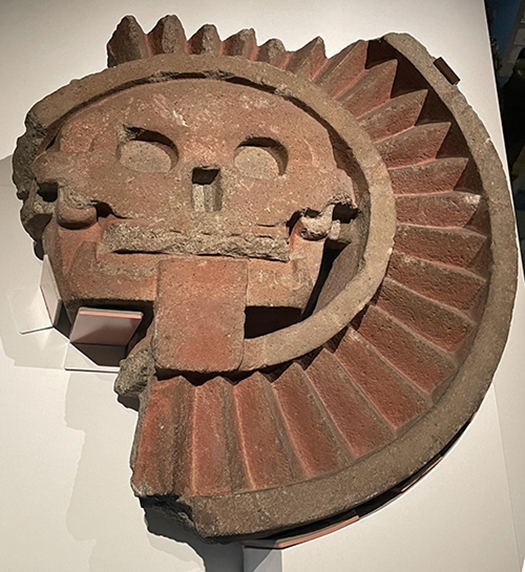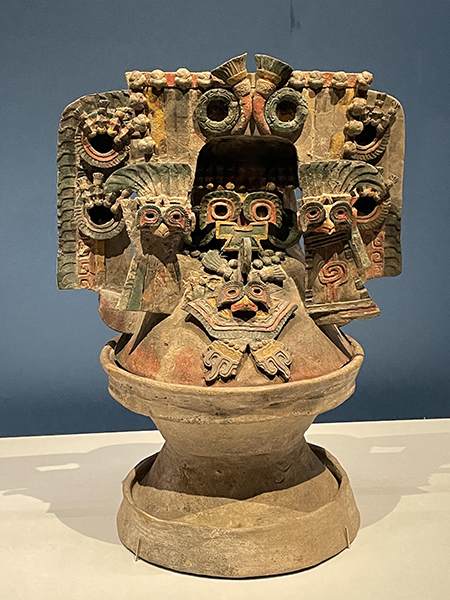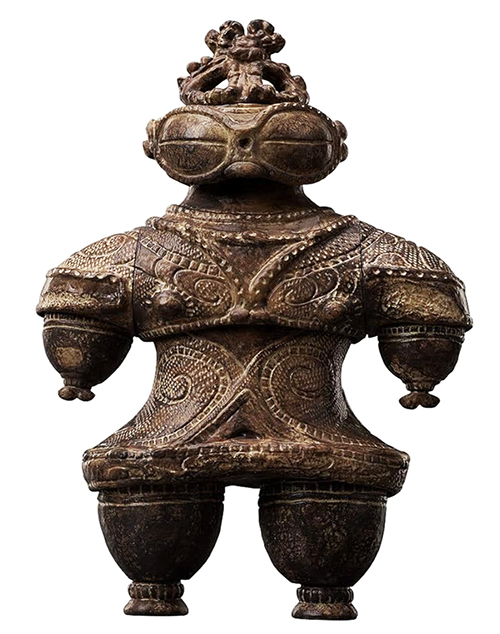

古代メキシコで紀元前100年当時から紀元550年当時まで栄えた高地文明「テオティワカン」を見て来た。
その中心施設「太陽のピラミッド」から出土した「死のディスク石彫」と呼ばれるのがいちばん上のもの。舌を出す頭蓋骨の周囲に放射状のモチーフを配している。鼻には穴が空き、ナイフを刺した表現とみられる。メソアメリカでは日没とは死を意味し、日の出は再生を意味するとされた。
下の画像は宮殿建築から出土した香炉。香を焚く胴部と煙突、蓋からなる香炉。型作りのパーツを組み合わせた華美な装飾性が見られる。これは矢や楯などのモチーフから戦士の鎮魂の意味を込めた儀礼などに使われたモノと推定されている。
こうした作品群、その作り手と社会の状況を想起すると、やはり日本の縄文社会が惹起される。

これは片足ではなく両足を備えた遮光器土偶のレプリカ造形。
わたしたち日本民族でも、たしかに存在した縄文社会の状況について、その社会の構造、倫理システムなどを十全に把握できているワケではない。だけれども、ネイティブな日本人らしさの根源部分にこういった造形を生み出すコアが存在していることはあきらかでしょう。
そして、古代メキシコの人びとの造形感覚と人類普遍的な部分の共有を感じさせられる。先般、東京国立博物館展示では遮光器について、北方民族が白く輝く雪原風景のなかで視野を保守するためにその反射光の影響を緩和させる道具として、人類普遍的に開発されて、それを津軽で使っている例証ではないかという説が開陳されていた。そうだとすれば日本列島からさらにアリューシャンを超えベーリング海を渡ってアメリカ大陸に至った人類として、そうした精神性痕跡が共通しているのかも知れない。
どちらも宇宙的で異星人的なオカルトを覚醒させるには十分すぎる(笑)。ひょっとして30,000前頃に東アジア列島を経由してアメリカ大陸にまで到達した人類の種族には、そのようなオカルト系の想像力の類縁性も濃厚に持っていたのかも知れない。
死のディスクと遮光器土偶をつなぐこころのつながりの部分が人類のDNA情報解析の進展で明示的な根拠が示されていく可能性もあるかもしれない。そんな妄想を抱かせるほどに両者には共通するものを感じる。
さて古代メキシコでもいちばん知名度の少ないテオティワカン文化を見て来たけれど、明日以降、よりポピュラーなマヤ・アステカについて見ていくことにします。だんだん日本史もより解明された段階になっていくので、比較文化も面白くなってくるのではないかと思っています。乞うご期待。
English version⬇
[A society dominated by the beauty of clay figurines? Ancient Mexico-7]
After the separation of the human race 30,000 years ago, the commonality of the sense of form appeals to us like a faraway “echo”. Occultism may be the missing link. …….
I visited Teotihuacan, a highland civilization that flourished in ancient Mexico from 100 BC to 550 AD.
The topmost one is called the “Death Disc Stone Carving” excavated from the Pyramid of the Sun, the central facility of Teotihuacan. Radial motifs are arranged around a skull with a tongue protruding. The nose has a hole in it, which is thought to represent a knife. In Mesoamerican culture, sunset meant death and sunrise meant rebirth.
The image below shows an incense burner excavated from a palace building. The censer consists of a body, chimney, and lid for burning incense. It shows flamboyant decorative characteristics by combining molded parts. The motifs of arrows and shields suggest that it was used as a ritual object for the repose of the souls of warriors.
When we recall these works, their makers, and the social context in which they were made, we are reminded of Japan’s Jomon society.
This is a replica of a Shakugi Clay Figure with not one but two legs.
Even we Japanese do not have a complete understanding of the structure and ethical system of the Jomon society that existed. However, it is clear that there is a core of native Japanese-ness that gives rise to these forms.
It also makes us feel that the ancient Mexican people shared the same sense of formative arts and a universal part of humanity. Recently, at the Tokyo National Museum exhibition, a theory was put forward that shading devices were universally developed by northern peoples as tools to mitigate the effects of reflected light in order to maintain their field of vision in the shining white snowfield landscape, and that this is an example of their use in Tsugaru. If this is so, it is possible that the human race, which has crossed the Aleutians and the Bering Sea from the Japanese archipelago to the American continent, shares such traces of spirituality.
Both are more than enough to awaken the cosmic and alien occult (laugh). Perhaps the human race that reached the Americas via the East Asian archipelago around 30,000 years ago also had a strong affinity for such occult imaginations.
There may be a possibility that the mental link between the death disc and the light-shielding clay figurine will be explicitly evidenced by the progress of human DNA information analysis. I feel that there is enough in common between the two to make me have such a fantasy.
Now that we have looked at the Teotihuacan culture, which is the least well-known culture in ancient Mexico, we will look at the more popular Maya Aztecs from tomorrow onward. As Japanese history is gradually becoming more understood, I believe that comparative culture will also become more interesting. Stay tuned.
Posted on 9月 23rd, 2023 by 三木 奎吾
Filed under: 歴史探訪







コメントを投稿
「※誹謗中傷や、悪意のある書き込み、営利目的などのコメントを防ぐために、投稿された全てのコメントは一時的に保留されますのでご了承ください。」
You must be logged in to post a comment.